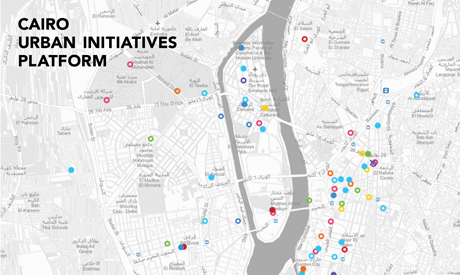Latest NEWS
- Aswat Masriya, the last word
- Roundup of Egypt's press headlines on March 15, 2017
- Roundup of Egypt's press headlines on March 14, 2017
- Former Egyptian President Hosni Mubarak to be released: lawyer
- Roundup of Egypt's press headlines on March 13, 2017
- Egypt's capital set to grow by half a million in 2017
- Egypt's wheat reserves to double with start of harvest -supply min
- Roundup of Egypt's press headlines on March 12, 2017
Mapping Cairo's initiatives to foster collaboration

Cairo Urban Initiatives Platform
By Rowan El Shimi
Launched in April, the Cairo Urban Initiatives Platform (CUIP in short) functions in Arabic and English as an interactive map showcasing profiles of institutions, non-governmental organisations, culture spaces and companies working in a multitude of disciplines. It also provides a shared calendar for events related to these initiatives.
With the upsurge of energy and creativity that came with Egypt's 2011 revolution and the endless initiatives and collectives spurred across all disciplines, it has become quite difficult to find out who is doing what, whether work is being repeated or locate like-minded groups to collaborate with.
CUIP launches at a time of need for this kind of information and to bridge gaps between initiatives in arts, advocacy, social development, media, architecture, urban planning or basically any initiatives that have to do with life in the city and its public space.
"We started identifying and mapping these many initiatives; who is who, what are they doing, what is their capacity, what's the range of programmes, what's the size, who is this company, NGO, and what collaborations exist," Omar Nagati, founder the Cairo Laboratory for Urban Studies, Training and Research (CLUSTER) told Ahram Online one evening before the launch.
"The idea was to start building a database, a platform, where people can find each other thus encourage collaboration and overlaps and minimise repetition."
The process of collecting the information and getting several initiatives on board started in July 2012 in a meeting at the British Council in Aguza where CLUSTER invited 40 individuals and organisations to start a conversation on the need to map out the efforts being made all over the city.
Four months later, they invited even more people at the Goethe Institute, where CLUSTER had a mock-up of the website ready and collected ideas and feedback while discussing art in public space in all its legal, social and political frameworks.
"It was important for us to have these networking meetings to get people working on initiatives in a room together and think of how we can collaborate," Beth Stryker, a partner at CLUSTER told Ahram Online stressing that people at those meetings saw a need for a tool to enable them to find out what people are doing and collaborate.
The CUIP map has two main functions: the directory, which helps users find initiatives, view their profiles, contact information and latest updates, and, secondly, the shared calendar that allows users to skim through events in the city.
The aim is for the platform's content to be user-generated. This can be tricky, because with all the maintenance initiatives must do for their own online portals and social media accounts, it could prove burdensome to constantly update CUIP and therefore, keep the initiative relevant.
The team over at CLUSTER are taking it one step at a time. Their content manager oversees the process of training the representatives from each initiative on using the system and ensuring that the events are all in place.
"At the moment it's a mix between user-generated content and the information we researched and posted ourselves," Stryker said. "Ideally in the future it would be entirely user-generated content," she reiterated.
The calendar allows for date changes and cancellations, keeping in considerate mind of Egypt's volatile situation, where occasionally a political flare-up will affect an event. The calendar also fosters collaboration by allowing for several initiatives to host and manage events on the page.
CUIP can be found on www.cuipcairo.org and initiatives are encouraged to contact CUIP's content manager on info@cuipcairo.org










